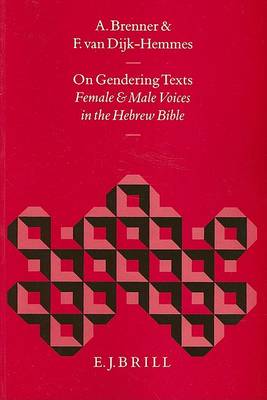Biblical Interpretation
2 primary works
Book 1
On Gendering Texts is a wonderful book in a field that demonstrates its maturity by this publication. It discusses the important and traditional issue of authorship. Whereas the idea of a unique and divinely inspired biblical author has long been abandoned, the issue of authorship itself has not.
The possibility that women might have contributed to the production of the Bible has not been taken seriously and yet the idea that everything is male unless otherwise proven is hardly acceptable. What can one do? The two authors of this book shrewdly displace the question. Rather than worrying about unprovable historical authors, they consider gender-positions; authority; gendered textuality and attributions of gender within the text; voice; world-view and ideological content. Each of these issues is important, and the gesture of raising them in connection with that of authorship alone makes this book worthwhile.
This book is both unique and in line with a growing tradition; a climatic point in the developing area of feminist biblical study. [from the Foreword by Mieke Bal]
The possibility that women might have contributed to the production of the Bible has not been taken seriously and yet the idea that everything is male unless otherwise proven is hardly acceptable. What can one do? The two authors of this book shrewdly displace the question. Rather than worrying about unprovable historical authors, they consider gender-positions; authority; gendered textuality and attributions of gender within the text; voice; world-view and ideological content. Each of these issues is important, and the gesture of raising them in connection with that of authorship alone makes this book worthwhile.
This book is both unique and in line with a growing tradition; a climatic point in the developing area of feminist biblical study. [from the Foreword by Mieke Bal]
Book 26
This groundbreaking book, which builds on the author's earlier work in On Gendering Texts, studies how, by what means and to what extent human love, desire and sex, and possibly even 'sexuality', are gendered in the Hebrew Bible. Following a classification and gendering of the linguistic and semantic data, the investigation looks into the construction of male and female bodies in language and ideologies; the praxis and ideology of sex, procreation and contraception; deviation from socio-sexual boundaries (e.g. incest, rape, adultery, homosexuality, prostitution); eroticism and "pornoprophetics". Finally, the work discusses some of the wider sociological and theological implications of the findings.

